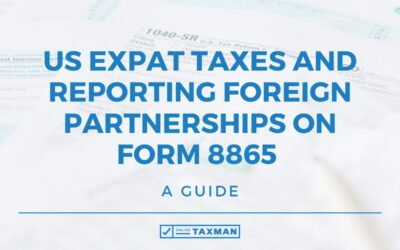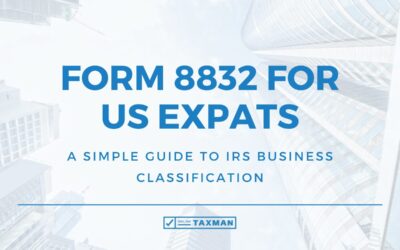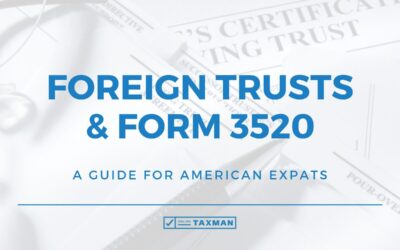President Trump’s Big Beautiful Bill Act became law in July 2025. Behind the bluster is a tax overhaul that changes how many Americans abroad will file in 2026.
While the bill slashes domestic programs and repeals green incentives, it also introduces several new measures that affect Americans living overseas. Additionally, it doesn’t fulfil Trump’s campaign promise to alleviate the filing burden for expats.
Here’s what you need to know if you live outside the US.
No change to citizenship-based taxation
The US remains the only major country that taxes based on citizenship, not residency. Despite Trump’s campaign promise to change it, it’s still the case after this bill.
Every US citizen – no matter where they live – must continue filing a US tax return every year. That includes reporting income, foreign bank accounts, and foreign businesses.
What hasn’t changed:
- You still have to report worldwide income
- FBAR and FATCA filing thresholds remain active
- Citizenship-based taxation continues as the standard
There was no serious effort in Congress to move to a residence-based system.
‘Revenge Tax’ shelved
Section 899 – known as the “revenge tax” – would have limited expats’ ability to use the foreign tax credit (FTC). That surtax is gone.
Expats can continue to offset foreign income taxes against their US liability using Form 1116.
Why this matters:
If you live in a high-tax country like Germany, France, or the UK, the FTC often wipes out your US tax bill. You can still rely on it.
There’s no surtax, no limitation, and no need to restructure foreign business income for this purpose.
FEIE unchanged
The Foreign Earned Income Exclusion (FEIE) wasn’t changed. The $130,000 exclusion (for tax year 2025) remains in place.
What you should know:
- No increase or cost-of-living adjustment
- Still applies just to earned income, not passive income
- You must still qualify based on residency or physical presence
New 1% remittance tax on some transfers from the US
A new 1% excise tax now applies to some remittances sent out of the US, including transfers to your own accounts abroad.
This means Americans abroad could face a tax on moving money between their US and foreign accounts.
The tax is applied to qualifying remittance, being transfers made via cash, money orders, or cashier’s checks.
Transfers of funds made from a US bank or money service are exempt, however. This means that when you transfer money out of the US, be careful which service you use to avoid the new tax.
You may want to compare transfer services and ask whether they’ll apply the 1% tax or report transfers on your behalf.
Note that the tax doesn’t apply to LLCs making inter, just individuals.
Child Tax Credit raised and available with just one parent SSN
The Child Tax Credit has increased to $2,500 per qualifying child. For expats, the most significant update is who qualifies.
In the final bill, only one parent on a joint return needs a valid US Social Security Number (SSN) to claim the refundable portion of the credit, while the original House version mandated two. Previously, parents only required ITINs. In practise, the change won’t now affect too many US expat parents, only non-US citizen parents of US citizen children.
Stricter verification for federal benefits
Accessing federal programs from abroad is now harder. Tighter ID verification applies to Medicaid, SNAP, ACA subsidies, and related benefits.
If you or your family use these programs while abroad:
- You’ll need more documents to prove eligibility
- Mixed-status households may face increased delays or rejections
- Physical presence in the US may now be required more often
This isn’t a tax change, but it will affect US expats who use or apply for benefits remotely.
No FATCA relief for expats
Despite lobbying, the bill does nothing to ease FATCA burdens. Many Americans abroad still face foreign bank account closures, denied mortgage applications, or financial lockouts due to US status.
FATCA remains:
- A major reason why foreign banks turn away US citizens
- A driver of US citizenship renunciations
- Unchanged by the new law – there’s no new exemption, threshold relief, or reduction in compliance requirements.
SALT deduction cap raised – with income limits
The cap on the state and local tax (SALT) deduction is now lifted to $40,000 – but only for those under certain income thresholds:
- Single filers: adjusted gross income (AGI) under $250,000
- Married filing jointly: AGI under $500,000
How it effects expats:
- Many expats still file state returns due to property, dependents, or part-year residency
- High-tax states like California and New York could now allow larger deductions
- This may reduce your overall federal tax burden – if you qualify
State tax liability doesn’t necessarily go away when you move abroad. This change can make a real difference for filers with active state ties.
Other important corporation filing changes in the OBBBA
Repeal of the QBAI Deduction
The Qualified Business Asset Investment (QBAI) deduction, which allowed US shareholders of Controlled Foreign Corporations to exclude a deemed return on tangible assets from GILTI, has been repealed under the new law. This means all of a CFC’s tested income is now subject to inclusion, regardless of asset base, increasing the exposure for asset-heavy foreign subsidiaries.
Section 250 Deduction Adjustment and Effective GILTI Rate
What was formerly called “GILTI” (Global Intangible Low-Taxed Income) has been renamed under the new law as “Net CFC Tested Income (NCTI)”, but it functions similarly for purposes of inclusion and deduction.
While the nominal GILTI tax rate hasn’t changed directly, the Section 250 deduction for C corporations has been reduced from 50% to 40%, increasing the effective tax rate on GILTI from 10.5% to 12.6%.
Increase in GILTI FTC Haircut from 80% to 90%
Previously, only 80% of foreign taxes paid on GILTI were eligible for the Foreign Tax Credit. The OBBBA raises this threshold to 90%, reducing the residual US tax owed on foreign income if the underlying foreign tax rate is at least ~14%. This provides modest relief to taxpayers in higher-tax jurisdictions.
What you should do now
This bill changes the landscape for US expats. To stay compliant and avoid penalties, take the following steps:
- Review your international transfers – the new remittance tax may apply
- Update your dependent info – one parent SSN is now enough for the refundable Child Tax Credit
- Watch your filing deadlines – penalties have increased, and grace periods have shrunk
- Examine your foreign accounts – you may need to file FBAR or Form 8938 for the first time
- Reassess your state filing – the higher SALT cap could lower your federal tax if you qualify
Trump’s Big Beautiful Bill doesn’t overhaul the system for expats – but it tightens rules and adds new traps. While the Foreign Tax Credit and FEIE survive intact, compliance is now riskier.
New taxes, stricter verification, and lowered reporting thresholds all mean one thing: it’s time to get more organized.
If you’re a US citizen living abroad, get ahead of this now. The new rules apply to the 2025 tax year – filed in 2026. Review your accounts, gather your documents, and consult with a tax expert who specializes in expat returns.
As always, if you’d like to optimize your US taxes as an American living abroad, get in touch.








